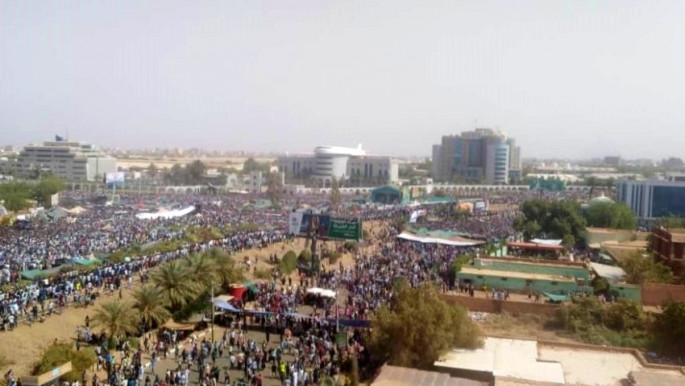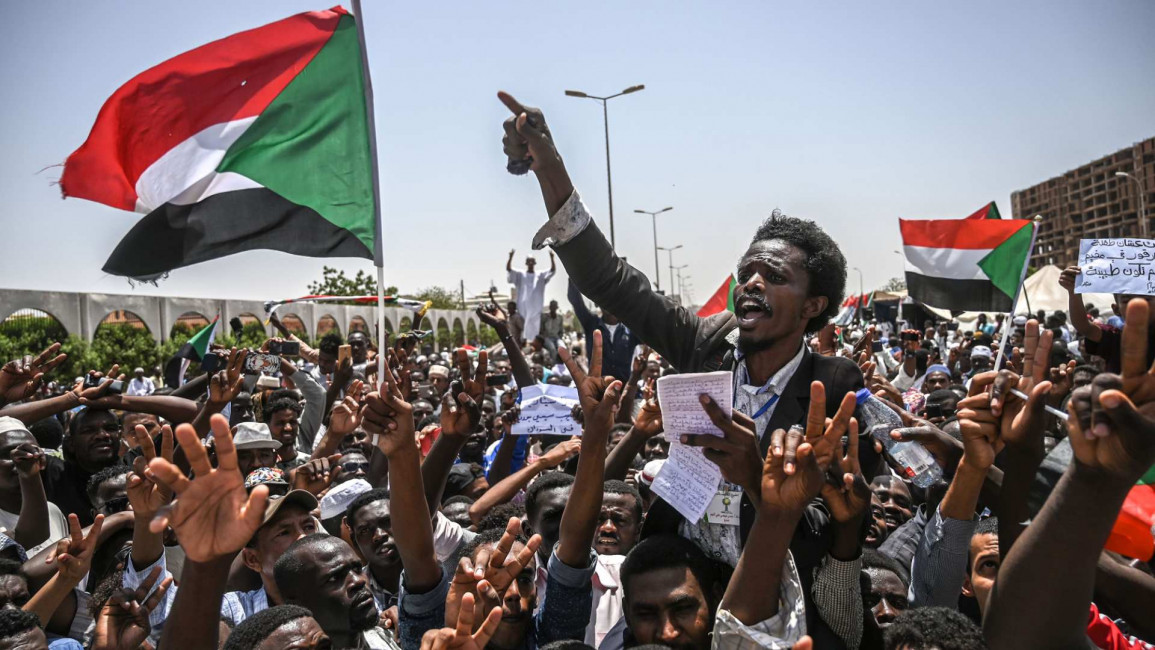Sudan remembers bittersweet anniversary of sit-in that toppled former dictator Omar al-Bashir
Sudan remembers bittersweet anniversary of sit-in that toppled former dictator Omar al-Bashir
April 6 marks the first anniversary of a mass sit-in in Sudan that prompted the ousting of dictator, Omar Al-Bashir.
5 min read
At least 129 people were killed when Sudanese forces raided the sit-in last June [AFP]
Sudanese took to social media on Monday to commemorate the first anniversary of the mass protest that unseated former President Omar Al-Bashir.
The anniversary of the 6 April 2019 demonstration is for many a bittersweet moment, combining the highs of the Khartoum sit-in that led to the end of Bashir's 30-year-rule with the lows of the brutal dispersal of the camp two months later.
"On this day last year, the will of the people triumphed and ended the awful 30-year rule of the Islamists, presenting an important opportunity for Sudan to respect human rights and the rule of law, and to raise the slogan of 'freedom, peace and justice'," said one Twitter user.
Another tweeted: "6 April 2020. The first anniversary of the greatest sit-in in the history of Sudan, which came as the end of the 4 months-long protests that finally led to the overthrow of one of the most dictatorial regimes in Africa."
"May Allah [God] have mercy on the honourable martyrs," the Twitter user added.
On 6 April, Sudanese protesters from across the capital Khartoum and its sister-city Omdurman marched towards the military headquarters.
Organisers had called for a mass demonstration with the hopes of prompting the powerful military to act, after nearly four months of protests against Bashir's regime, which had been met with tear gas, bullets and detentions by security forces.
The date, 6 April, was chosen to coincide with the anniversary of the 1985 uprising against military ruler Jaafar Nimeiri.
Read more: 'A portal into tomorrow's Sudan': Inside the sit-in that brought down Sudan's dictator Bashir
While security forces fired at and detained protesters attempting to reach the military headquarters, eyewitnesses said that hundreds of thousands eventually made their way to way to the area, commencing a mass sit-in.
Individual soldiers reportedly sided with demonstrators over the coming days, defending them from attacks by security forces.
Just a few days later, on 11 April, the military announced it had toppled Bashir, ending nearly 30 years of his rule. The mass protest also led to the resignation one day later of coup leader Awad Ibn Auf.
[Article continues after interactive timeline below]
The mass sit-in continued as protest leaders entered negotiations with the military in hopes of a democratic transition, which ultimately produced a joint military-civilian governing council in August last year.
But continuing attacks on the protesters, which rights groups and eyewitnesses blame on the paramilitary Rapid Support Forces (RSF), culminated in a brutal raid of the sit-in on 3 June.
RSF troops and other forces allegedly beat, shot and raped demonstrators, injuring thousands and killing dozens. The exact death toll is not known but doctors linked to the protest movement have said at least 129 people died.
Authorities gave a lower death toll of 87 and denied ordering the sit-in dispersal, while the US-based NGO Physicians for Human Rights estimates the "massacre" claimed up to 241 lives. "This is the day they worked for. Sing to them, my brothers. Long live the memory of the revolutionaries," said SudanUprising, a popular Twitter account that has documented the protests.
One Twitter user said: "The greatest thing about April 6 was that it surpassed all expectations. The [protest] movement had reached its weakest stage in March, in which voices of criticism were accompanied by a noticeable decrease in the number of demonstrators, to the extent that most people seriously lost hope and determination.
"Really, April 6 is a miracle I haven't been able to comprehend until the present day."
Another user wrote: "April 6th will never again pass as an ordinary day. It'll always be filled [with] overwhelming emotion and nostalgia. The day everyone stood in solidarity for the greater good of our beloved Sudan. The day every kid snuck out only to encounter their parents at the same place of union.
"We'll celebrate April 6th for the rest of our lives. Decades ahead, [with] our kids and grandchildren; We'll wave flags and chant revolutionary mantras and share tales of our days and nights at the [sit-in]. We'll tell them how after 30 years of despair, for the first time, hope was in everyones heart."
Another described the day simply as one "that filled the earth with promise and hope".
But for others, 6 April has been hard day to celebrate amid disappointment over the lasting role of military generals and the slow progress of political transition.
"I've been trying to think what to say on this anniversary of Sudan's revolution. My overwhelming feeling is of sadness and loss. At a revolution stolen by Generals and political elites. Mostly I'm sad for our martyrs but I'm also sad for our children robbed of a better future," said one Twitter user.
Another replied: "Today should've been a day for celebration; instead it's a reminder of a failed revolution with so much potential."
Sudanese security forces blocked roads leading to the military headquarters in the capital on Monday, an AFP correspondent said.
Soldiers and armoured vehicles were stationed around the military headquarters in Khartoum, while surrounding streets were closed with concrete blocks and barbed wire erected.
The movements came in apparent anticipation of a protest commemorating the one-year anniversary of the onset of the sit-in.
While most commemorated the date from their homes due to the coronavirus pandemic, a small group reportedly gathered in the capital. They were met with tear gas fired by security forces, according to activists on social media.
Follow us on Facebook, Twitter and Instagram to stay connected
The anniversary of the 6 April 2019 demonstration is for many a bittersweet moment, combining the highs of the Khartoum sit-in that led to the end of Bashir's 30-year-rule with the lows of the brutal dispersal of the camp two months later.
"On this day last year, the will of the people triumphed and ended the awful 30-year rule of the Islamists, presenting an important opportunity for Sudan to respect human rights and the rule of law, and to raise the slogan of 'freedom, peace and justice'," said one Twitter user.
Another tweeted: "6 April 2020. The first anniversary of the greatest sit-in in the history of Sudan, which came as the end of the 4 months-long protests that finally led to the overthrow of one of the most dictatorial regimes in Africa."
"May Allah [God] have mercy on the honourable martyrs," the Twitter user added.
On 6 April, Sudanese protesters from across the capital Khartoum and its sister-city Omdurman marched towards the military headquarters.
Organisers had called for a mass demonstration with the hopes of prompting the powerful military to act, after nearly four months of protests against Bashir's regime, which had been met with tear gas, bullets and detentions by security forces.
The date, 6 April, was chosen to coincide with the anniversary of the 1985 uprising against military ruler Jaafar Nimeiri.
Read more: 'A portal into tomorrow's Sudan': Inside the sit-in that brought down Sudan's dictator Bashir
While security forces fired at and detained protesters attempting to reach the military headquarters, eyewitnesses said that hundreds of thousands eventually made their way to way to the area, commencing a mass sit-in.
Individual soldiers reportedly sided with demonstrators over the coming days, defending them from attacks by security forces.
Just a few days later, on 11 April, the military announced it had toppled Bashir, ending nearly 30 years of his rule. The mass protest also led to the resignation one day later of coup leader Awad Ibn Auf.
[Article continues after interactive timeline below]
The mass sit-in continued as protest leaders entered negotiations with the military in hopes of a democratic transition, which ultimately produced a joint military-civilian governing council in August last year.
But continuing attacks on the protesters, which rights groups and eyewitnesses blame on the paramilitary Rapid Support Forces (RSF), culminated in a brutal raid of the sit-in on 3 June.
RSF troops and other forces allegedly beat, shot and raped demonstrators, injuring thousands and killing dozens. The exact death toll is not known but doctors linked to the protest movement have said at least 129 people died.
Authorities gave a lower death toll of 87 and denied ordering the sit-in dispersal, while the US-based NGO Physicians for Human Rights estimates the "massacre" claimed up to 241 lives. "This is the day they worked for. Sing to them, my brothers. Long live the memory of the revolutionaries," said SudanUprising, a popular Twitter account that has documented the protests.
One Twitter user said: "The greatest thing about April 6 was that it surpassed all expectations. The [protest] movement had reached its weakest stage in March, in which voices of criticism were accompanied by a noticeable decrease in the number of demonstrators, to the extent that most people seriously lost hope and determination.
"Really, April 6 is a miracle I haven't been able to comprehend until the present day."
 |
| Huge crowds gather at the military headquarters in Khartoum [Anadolu] |
Another user wrote: "April 6th will never again pass as an ordinary day. It'll always be filled [with] overwhelming emotion and nostalgia. The day everyone stood in solidarity for the greater good of our beloved Sudan. The day every kid snuck out only to encounter their parents at the same place of union.
|
|
"We'll celebrate April 6th for the rest of our lives. Decades ahead, [with] our kids and grandchildren; We'll wave flags and chant revolutionary mantras and share tales of our days and nights at the [sit-in]. We'll tell them how after 30 years of despair, for the first time, hope was in everyones heart."
Another described the day simply as one "that filled the earth with promise and hope".
But for others, 6 April has been hard day to celebrate amid disappointment over the lasting role of military generals and the slow progress of political transition.
"I've been trying to think what to say on this anniversary of Sudan's revolution. My overwhelming feeling is of sadness and loss. At a revolution stolen by Generals and political elites. Mostly I'm sad for our martyrs but I'm also sad for our children robbed of a better future," said one Twitter user.
Another replied: "Today should've been a day for celebration; instead it's a reminder of a failed revolution with so much potential."
Sudanese security forces blocked roads leading to the military headquarters in the capital on Monday, an AFP correspondent said.
Soldiers and armoured vehicles were stationed around the military headquarters in Khartoum, while surrounding streets were closed with concrete blocks and barbed wire erected.
The movements came in apparent anticipation of a protest commemorating the one-year anniversary of the onset of the sit-in.
While most commemorated the date from their homes due to the coronavirus pandemic, a small group reportedly gathered in the capital. They were met with tear gas fired by security forces, according to activists on social media.
Follow us on Facebook, Twitter and Instagram to stay connected



